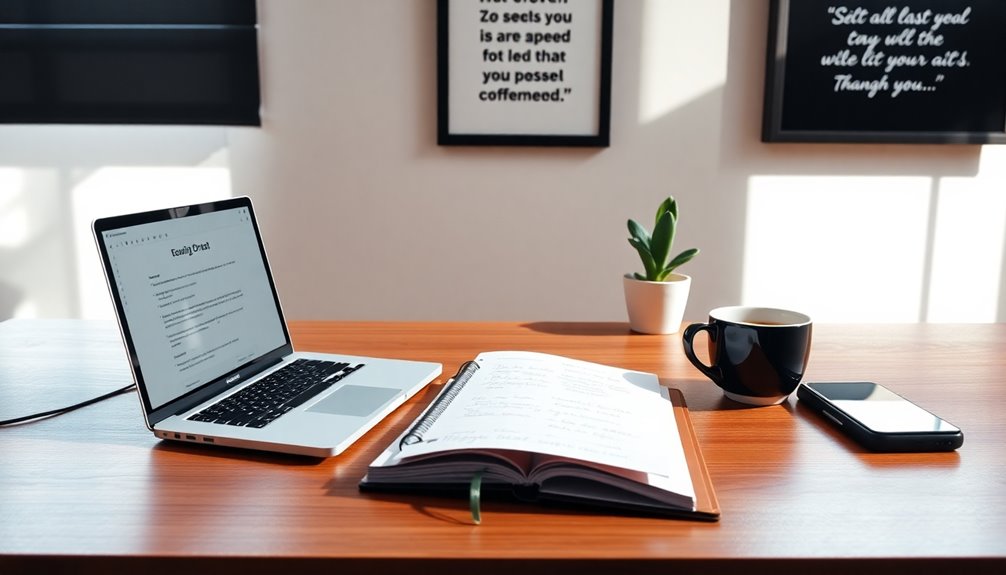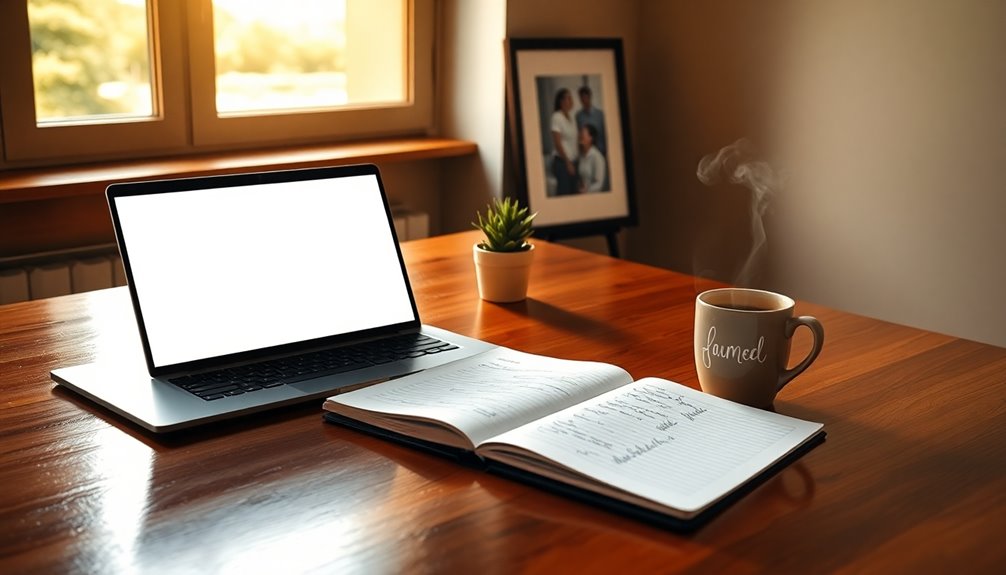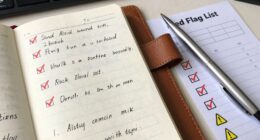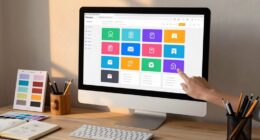To write a follow-up email that gets you hired, start with a clear subject line that includes the job title and your name. Within one to two weeks post-application, express genuine gratitude and highlight relevant skills or experiences that connect to the role. Keep your tone professional, and personalize the message by mentioning your interactions with the hiring team. Ask one or two focused questions to show your continued interest. A well-crafted email not only reinforces your candidacy but also keeps you memorable to the hiring manager. Find out more essential tips for crafting an impactful follow-up. Maintain a concise and organized structure to ensure your message is easy to read and impactful. When writing effective followup emails, avoid being overly pushy or repetitive, as this can detract from your professionalism. Instead, focus on showcasing your enthusiasm for the role and reiterating how your unique qualifications align with the company’s needs.
Key Takeaways
- Send your follow-up email 1-2 weeks after applying to demonstrate professionalism and respect for the hiring timeline.
- Personalize your email by mentioning the hiring manager's name and referencing specific skills or experiences relevant to the job.
- Use a clear and concise subject line that includes the job title, your name, and the company name for easy identification.
- Maintain a formal tone, express gratitude for their time, and limit your questions to 1-3 focused inquiries about the hiring process.
- Proofread your email for clarity and professionalism to leave a positive impression on potential employers.
Introduction
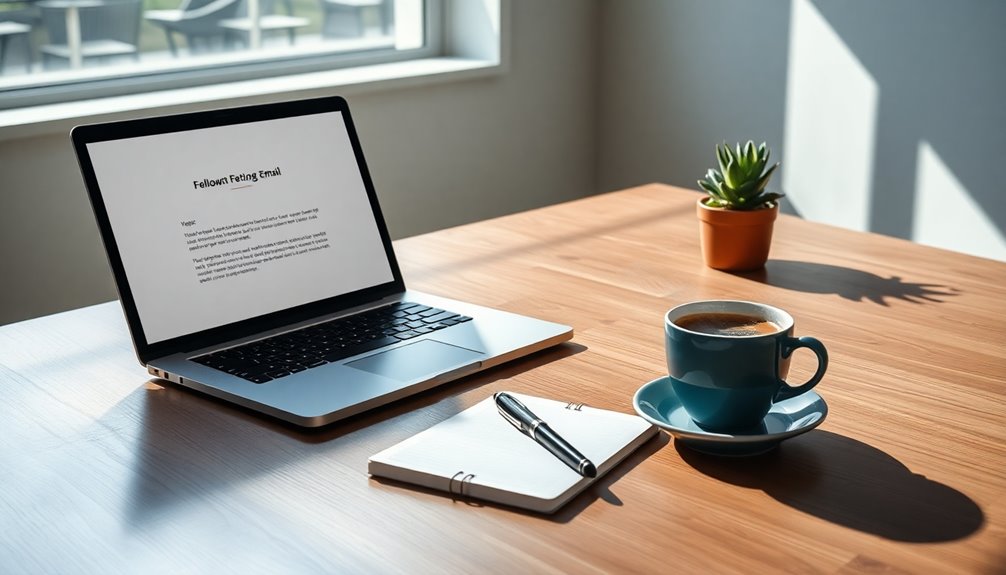
When you've put in the effort to apply for a job, it's important to keep the momentum going with a follow-up email. This email serves as a vital communication tool that helps reinforce your interest in the position while keeping your application top of mind for hiring managers.
Sending a follow-up email 1-2 weeks after submitting your application not only shows professionalism but also demonstrates your initiative, which can positively influence hiring decisions.
In your follow-up email, be sure to express your interest and gratitude for the employer's time. Personalizing your message by referencing specific skills and experiences related to the job can enhance your candidacy and make your email stand out.
Also, include a clear subject line that specifies the job title and your name to ensure your email is easily identifiable and not overlooked.
A well-crafted follow-up email opens the door for potential networking opportunities and further discussion about the role, allowing you to stay engaged in the hiring process.
Builds Candidate Visibility

A follow-up email boosts your visibility to hiring managers, making it easier for them to recall your application in a sea of candidates. When you send a personalized follow-up email, addressing it directly to a specific individual within the company, you enhance the chances of it being read and considered seriously. This personal touch shows your genuine interest in the position and the organization.
Including a brief summary of your unique qualifications or experiences in the follow-up can further reinforce your candidacy. It reminds hiring managers of why you're a strong fit for the role and sets you apart from other candidates. Studies reveal that candidates who follow up after submitting applications are viewed as more proactive and committed, positively influencing hiring decisions in their favor. Additionally, demonstrating your financial planning for future roles can further illustrate your preparedness and foresight as a candidate.
Additionally, establishing a connection through follow-up communications opens the door to networking opportunities, which can benefit your career beyond this job application. By taking this initiative, you not only increase your visibility but also position yourself as a candidate who's engaged and enthusiastic about the opportunity. Moreover, following up can demonstrate your commitment to engagement, which is a trait highly valued in many organizations.
Clear and Engaging Subject Line

How can you grab a hiring manager's attention right from the start? A clear and engaging subject line is your first step. It should include the specific job title and your name, making it easy for the recipient to identify the purpose of your follow-up email immediately.
Aim for brevity—keep it under 50 characters so it displays well on all devices, especially mobile.
Use action-oriented language in your subject line, such as "Follow-Up on [Job Title] Application – [Your Name]." This conveys professionalism and clarity about your email's intent. Avoid vague or generic phrases; specificity is key to capturing the hiring manager's interest and increasing the odds they'll open your email.
Incorporating the company name can personalize your subject line even further. For instance, "Excited to Follow Up on [Job Title] at [Company Name] – [Your Name]" shows your enthusiasm and attention to detail.
Step-by-Step Guide to Follow-Up Emails
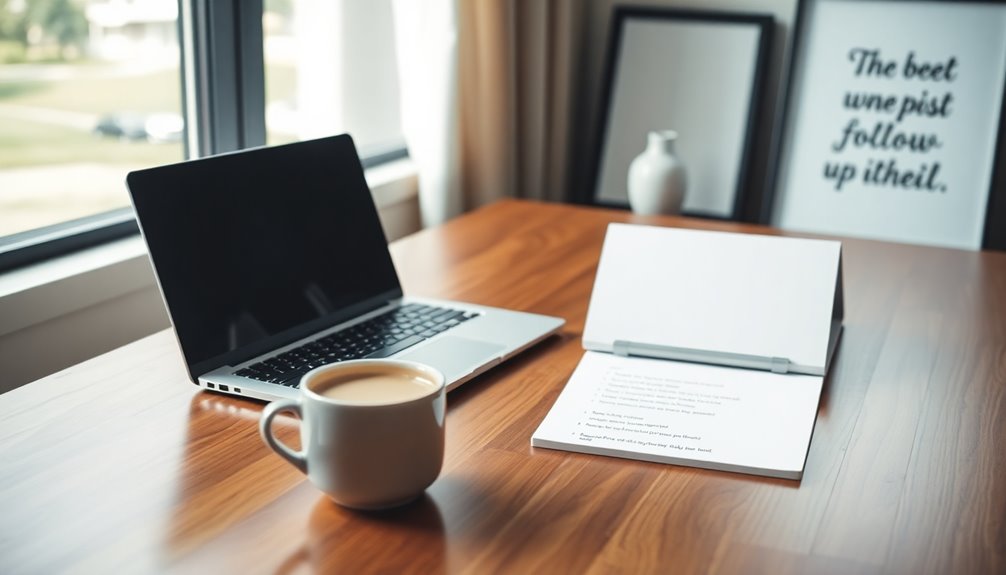
Crafting a follow-up email is essential after submitting your job application. Start with a clear subject line that includes the job title and your name, ensuring easy identification by the recipient.
In the body of your follow-up email, briefly reiterate your interest in the position and highlight your relevant skills or experiences, keeping the message concise and focused.
Begin with a polite greeting and express gratitude for the recipient's time. Reference the date of your application to remind them of your previous communication. This establishes context and shows you're engaged.
Then, ask specific questions about the hiring process or next steps. This demonstrates your continued interest without coming off as overly aggressive.
Dos and Don'ts for Follow-Ups

When it comes to follow-up emails, knowing the right approach can make all the difference. Start by personalizing your follow-up email. Address it to a specific individual, which increases the chances of hiring managers reading and responding to it.
Remember to express genuine gratitude for their time and consideration; this reflects positively on your professionalism.
Don't follow up too soon. Wait at least one week after submitting your application to give hiring managers adequate time to review applications thoroughly.
When you do follow up, limit inquiries to 1-3 focused questions about your application status or the hiring process. This keeps your communication clear and efficient.
Lastly, always proofread your email. Errors can undermine your credibility and distract from your message. A polished, professional follow-up email demonstrates your attention to detail and commitment to the role.
Sample Follow-Up Email Templates
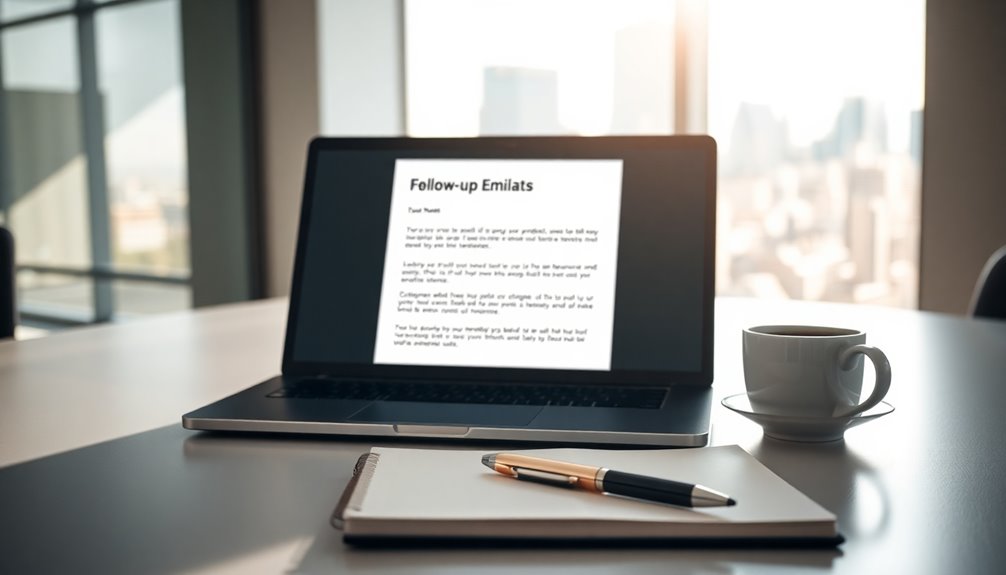
After mastering the dos and don'ts of follow-up emails, you might wonder how to structure your own message effectively.
Here's a concise job application follow-up email template you can adapt:
Subject Line: Application Follow-Up for [Position Title] – [Your Name]
Dear [Hiring Manager’s Name],
I hope this message finds you well.
I wanted to thank you for the opportunity to apply for the [Position Title] on [Application Date]. I'm writing to express my continued interest in the role and inquire about the status of my application.
I'm excited about the opportunity to join [Company Name] and believe my experience in [specific skill or experience] will allow me to contribute effectively to your team.
I'd love to highlight my unique qualifications that align with the needs of the position.
If possible, could you provide any updates on the timeline for the hiring process?
I appreciate your time and consideration, and I look forward to hearing from you soon.
Best regards,
[Your Name][Your LinkedIn Profile or Contact Information]Using this template, you can create a professional follow-up email that conveys your enthusiasm and keeps you on the hiring manager's radar.
Pro Tips for Writing Effective Emails
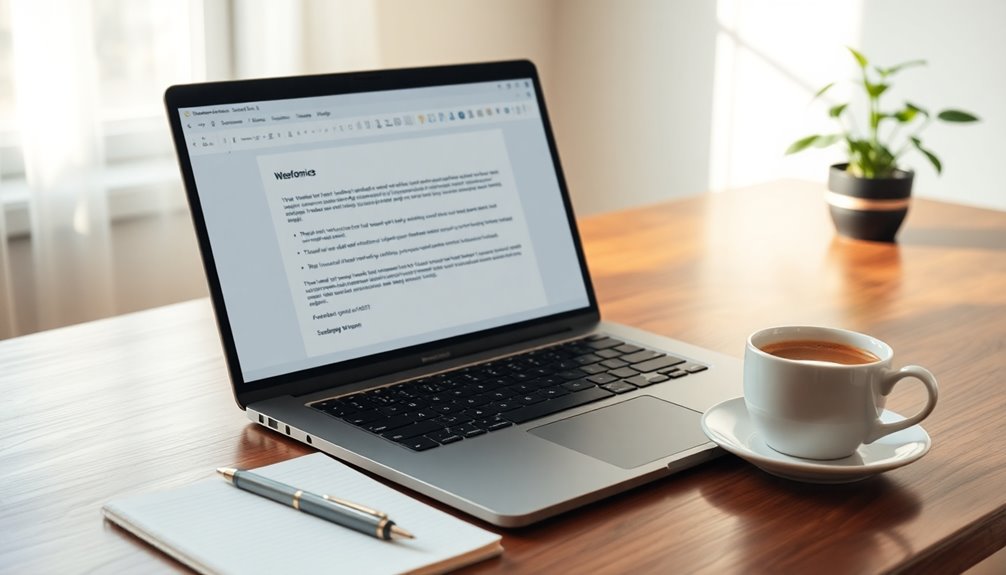
Effective follow-up emails can significantly enhance your job application process. To grab the hiring manager's attention, start with a clear and specific subject line that includes the job title and your name. This ensures your email is easily identifiable and stands out in their inbox.
Begin your email with a polite greeting, thanking the recipient for their time and consideration. This sets a professional tone right from the start.
Keep your message concise and focused—ideally under 150 words—to respect the hiring manager's time while effectively expressing your interest in the position.
In the body of your follow-up email, highlight 1-2 relevant qualifications or experiences that align with the job requirements. This reinforces your candidacy without simply repeating your resume.
Conclude your email with a polite call to action, such as asking for an update on the recruitment process or expressing a desire to discuss your application further. Additionally, remember that effective communication can significantly impact your chances of success, as non-verbal cues account for 93% of communication effectiveness.
Final Thoughts
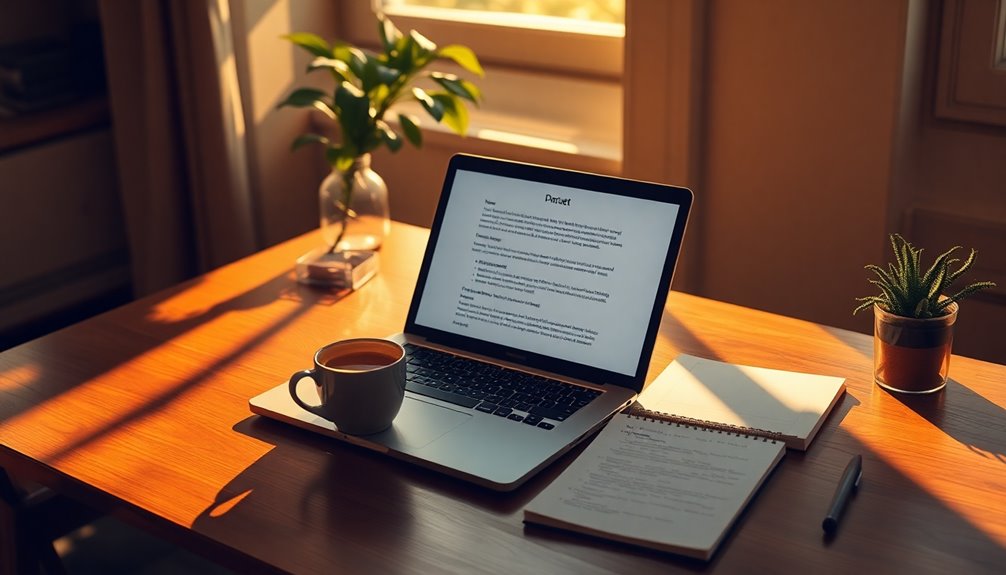
Crafting a follow-up email can be a game-changer in your job search. It's your chance to reinforce your interest in the position and demonstrate your professionalism. A well-written follow-up email can leave a positive impression on hiring managers, potentially influencing their decisions.
Personalizing your message by referencing specific skills and experience related to the job opportunity makes your email stand out.
Timing matters, so aim to send your follow-up one to two weeks after applying. This shows you respect the hiring process and gives them time to consider your application. In your email, maintain a professional tone and express gratitude for the recipient's time and consideration. This simple gesture can strengthen your candidacy.
Don't hesitate to include concise questions about the next steps in the hiring process. This not only shows your proactive attitude but also encourages a response.
Frequently Asked Questions
How Do You Politely Follow up on a Job Email?
To politely follow up on a job email, wait about a week or two after your initial message.
Address your email to the hiring manager and use a clear subject line that includes the job title.
Start with a friendly greeting, thank them for their time, and express your continued interest in the position.
Keep it brief and ask a specific question about the hiring timeline or next steps to encourage a response.
How Do You Write a Follow up Email After Accepting a Job Offer?
After accepting a job offer, you should send a follow-up email to express your gratitude and confirm your acceptance.
Start with a polite greeting, then mention your job title and start date.
Reinforce your enthusiasm for the role and clarify any next steps or paperwork you might need to complete.
Keep it concise and professional, respecting the recipient's time while ensuring all necessary details are included.
Conclude with a courteous closing.
How Do You Politely Ask About Your Application Status in Email?
To politely ask about your application status in an email, start with a friendly greeting and thank the recipient for their time.
Clearly mention the position you applied for and the date you submitted your application.
Inquire about the status respectfully, expressing your continued interest in the role.
Briefly highlight relevant skills to reinforce your candidacy.
How Do You Follow up on a Job Opportunity?
When you follow up on a job opportunity, wait about 1-2 weeks after submitting your application.
Address your email to the hiring manager or recruiter for a personal touch. Use a clear subject line with the job title and your name.
In your message, briefly restate your enthusiasm for the role and mention relevant skills.
